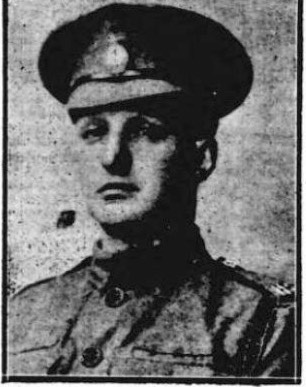Tpr
William Herbert Mumby
Informatie over geboorte
|
Geboortejaar: 1883 |
|
Geboorteplaats: Hinderwell, Yorkshire, Engeland, Verenigd Koninkrijk |
Algemene Informatie
|
Beroep: Verkoper textiel winkel |
Informatie legerdienst
|
Land: Engeland, Verenigd Koninkrijk |
|
Strijdmacht: British Expeditionary Force |
|
Rang: Trooper |
|
Service nummer: 2228 |
|
Dienstneming datum: 04/12/1906 |
|
Dienstneming plaats: Eskdaleside cum Ugglebarnby, Yorkshire, Engeland, Verenigd Koninkrijk |
|
Eenheden: — Household Bn. (Laatst gekende eenheid) |
Informatie over overlijden
|
Datum van overlijden: 12/10/1917 |
|
Plaats van overlijden: Requete Farm, Poelkapelle, België |
|
Doodsoorzaak: Killed in action (K.I.A.) |
|
Leeftijd: 34 |
Gedenkplaats
|
Tyne Cot Memorial Paneel: 3A |
Onderscheidingen en medailles 2
|
British War Medal Medaille |
|
Victory Medal Medaille |
Points of interest 3
| #1 | Geboorteplaats | ||
| #2 | Dienstneming plaats | ||
| #3 | Plaats van overlijden (bij benadering) |
Mijn verhaal
Trooper William Herbert Mumby served in the Household Battalion, part of the 10th Brigade of the 4th Division. Initially the Household Battalion was part of the Household Cavalry (the 1st and 2nd Life Guards and the Royal Horse Guards), but due to the increasingly mechanised war on the Western Front, the Battalion had to be retrained and re-equipped as foot soldiers drawn from the reserve units of the Household Cavalry in 1916.
On the 12th of October 1917 the 4th Division participated in the First Battle of Passchendaele, a phase of the Third Battle of Ypres. At 4 a.m. the Battalion moved into the planned position of assembly for the attack. This is described as being 150 yards east of the Poelcapelle-Vijfwegen road. Assembling the men proved hard and the Battalion had already lost 50 men, due to German shellfire even before the advance began.
Together with the Warwickshire Regiment on their left and with 1st King’s Own support, the Household Battalion advanced at 5.25 a.m. zero hour. Despite the terrible ground conditions and a heavy German resistance, the Battalion advanced according to plan and by 5.50am it had reached its first objective line near Requette Farm. From here on, German machine gun- and artillery fire increased and little headway was made, as the number of men dwindled. Due to heavy machine gun fire, coming from the direction Poelcapelle and the strongpoint at Helles House, the Battalion was unable to keep in touch with the 7th Royal West Kent Regiment (18th Division) on the right. The advance of the Household Battalion came to a total standstill. Eventually Requette Farm was recaptured by a German counter attack. Fighting around the farm was intense all day.
The Battalion had suffered considerable casualties and was relieved in part by the incoming 25th Northumberland Fusiliers in the night of 12/13 October. The relief was completed the next day. Having gone into this action 498 men strong, the Household Battalion suffered 348 casualties. Thirteen officers also became casualty.
Trooper William Herbert Mumby was killed in action. He possibly fell in the fighting around Requette Farm on the 12th of October 1917. His remains were never recovered or never identified and he is remembered on the Tyne Cot Memorial.
On the 12th of October 1917 the 4th Division participated in the First Battle of Passchendaele, a phase of the Third Battle of Ypres. At 4 a.m. the Battalion moved into the planned position of assembly for the attack. This is described as being 150 yards east of the Poelcapelle-Vijfwegen road. Assembling the men proved hard and the Battalion had already lost 50 men, due to German shellfire even before the advance began.
Together with the Warwickshire Regiment on their left and with 1st King’s Own support, the Household Battalion advanced at 5.25 a.m. zero hour. Despite the terrible ground conditions and a heavy German resistance, the Battalion advanced according to plan and by 5.50am it had reached its first objective line near Requette Farm. From here on, German machine gun- and artillery fire increased and little headway was made, as the number of men dwindled. Due to heavy machine gun fire, coming from the direction Poelcapelle and the strongpoint at Helles House, the Battalion was unable to keep in touch with the 7th Royal West Kent Regiment (18th Division) on the right. The advance of the Household Battalion came to a total standstill. Eventually Requette Farm was recaptured by a German counter attack. Fighting around the farm was intense all day.
The Battalion had suffered considerable casualties and was relieved in part by the incoming 25th Northumberland Fusiliers in the night of 12/13 October. The relief was completed the next day. Having gone into this action 498 men strong, the Household Battalion suffered 348 casualties. Thirteen officers also became casualty.
Trooper William Herbert Mumby was killed in action. He possibly fell in the fighting around Requette Farm on the 12th of October 1917. His remains were never recovered or never identified and he is remembered on the Tyne Cot Memorial.
Bronnen 2
|
Household Battalion , (The National Archives, KEW (TNA), WO 95/1481/1). Verdere verwijzing |
|
McCarthy C., The Third Ypres Passchendaele. The Day-by-Day Account, (London, Arms & Armour Press, 1995), pg. 117-118. Gebruikte bronnen |
Meer informatie 3
|
Commonwealth War Graves Commission Database https://www.cwgc.org/find-records/find-war-dead/casualty-details/831738 |
|
Namenlijst (In Flanders Fields Museum) https://namenlijst.org/publicsearch/#/person/_id=d31a2d15-64c9-4974-9641-7f9c7f3de485 |
|
Lives of the First World War (Imperial War Museum) https://livesofthefirstworldwar.iwm.org.uk/lifestory/3166421 |
